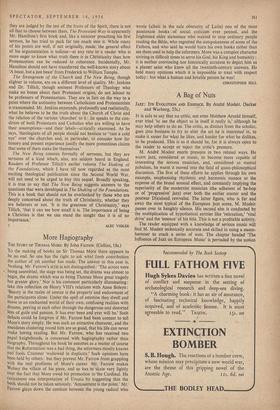More Hagiography
THE STORY OF THOMAS MORE. By John Farrow. (Collins, 18s.)
To the making of books on Sir Thomas More there appears to be no end. So one has the right to ask what fresh contribution the author of yet another has made. The answer in this case is, Nothing. Mr. Farrow's style is not distinguished : 'The actors were being assembled, the stage was being set, the drama was almost to begin, the drama which was to bring Thomas More great tragedy but greater glory.' Nor is his comment particularly illuminating : take this reflection on Henry VIII's relations with Anne Boleyn : 'Beauty in the realm of amour is the property and endowment of the participants alone. Under the spell of emotion they dwell and move in an enchanted world of their own, confusing realities with dreams, peering at each other through the dangerous and distorted lens of guile and passion. It has ever been and ever will be.' Such defects could be forgiven if Mr. Farrow had been content to tell More's story simply. He was such an attractive character, and the anecdotes clustering round him are so good, that his life can never make boring reading. But Mr. Farrow, who has received two Papal knighthoods, is concerned with hagiography rather than biography. Throughout his book he assumes as a matter of course that the Reformation was a bad thing, the reformers mostly knaves and fools. Cranmer 'wallowed in duplicity.' Such opinions have been held by others : but they prevent Mr. Farrow from grappling with the real problems of More's career. Mr. Farrow makes Wolsey the villain of his piece, and so has to skate very lightly over the fact that More owed his promotion to the Cardinal. He caricatures one interpretation of Utopia by suggesting that the book should not be taken seriously. 'Amusement is the point.' Mr. Farrow plays down the contrast between the young radical who
wrote (albeit in the safe obscurity of Latin) one of the most passionate books of social criticism ever penned, and the frightened elder statesman who wanted to stop ordinary people reading the Bible, who regretted the outspokenness of some of the Fathers, and who said he would burn his own books rather than see them used to help the reformers. More was a complex character striving in difficult times to serve his God, his King and humanity : it is neither convincing nor historically accurate to depict him as a plaster saint who knew all the twentieth-century answers. He held many opinions which it is impossible to treat with respect today: but what a human and lovable person he was!
CHRISTOPHER HILL


































 Previous page
Previous page